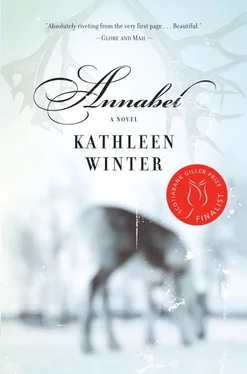“I just wanted to get something out of my coat pocket.”
“I need to get away by myself sometimes too.” Mr. Henry took hold of a piece of Wayne’s hair, which Wayne vowed to cut as soon as he got home, if he ever got home out of this, if Mr. Henry did not take all the grade five coats off their hooks and smother him. The teacher held the lock of Wayne’s hair the way Wayne’s mother held knobs of cold shortening with flour streaming down as she tenderly made pastry, using only her fingertips so as not to heat the silky mixture, then he let it go.
“If you ever need someone to talk to, about special things, things you don’t want anyone to know” — Mr. Henry’s voice was so low it was deadly, as if he were saying Wayne could murder someone and tell Mr. Henry about it and Mr. Henry would help him conceal the crime — “you can come to me.”
The bell rang, and it was so loud and shrill it made Wayne’s heart jump twice, and the corridor outside was filled with everyone yelling and clanging lockers open. The smell of chicken pies — the cheap kind in frozen boxes heated at 425 degrees for forty minutes — wafted around the doorpost, and the moment of Mr. Henry’s tenderness was, luckily for Wayne, finished. Mr. Henry spun on his shoe and barrelled towards the staff room without even saying goodbye to the boy he wanted. Wayne knew Mr. Henry wanted him. He didn’t know how, exactly, but he knew it had to do with appetite, and he avoided being alone with that man again. No matter what Mr. Henry did to meet Wayne alone, Wayne was a step ahead, even if he had to run. So he escaped from Mr. Henry, but he could not escape from the fact that a man had wanted him, and that his body had responded to that man with a secret desire of its own. An exquisite stirring, unwanted, involuntary, mysterious. A child of eleven awakens to sexual ecstasy and keeps it to himself, and thinks for a brief time that he, or she, is the only one in the world to whom this has happened. For a little while Wayne’s ecstasy remained hidden, like the bulb of any bloom, underground.
“It’s like Dad is mad at me all the time.” Wayne sat on the tall stool at the kitchen counter, talking to his mother while she cut onions. “How come?”
“He’s not mad at you.”
“He is.”
“He’s probably just tired. He wants the best for you. All fathers want the best for their children. He just wants to give you the skills you need to have a good life. He wants his son to be happy.”
“He is mad. I can tell by his voice.”
“Your father doesn’t raise his voice.” This was true. Treadway’s mother and father had screamed at each other throughout his childhood, and he had told Jacinta early in their marriage that he would not yell, and he did not want her to yell.
“It all comes out one way or another,” Jacinta told her sister later on the phone, but her sister was in a Mount Pearl subdivision and could not help her.
Treadway had no idea how to deal with tension. His house was as quiet as he had vowed it would be, but inner yelling was new to him, and when it began, he left the house and went in his boat to the island, or down his trapline.
THERE WAS A WAY YOU COULD WALK nonchalantly past Wally Michelin’s picket gate and make it seem you were on your way to the shortcut everyone used to get to the Hudson’s Bay store. Wayne wished he could go through Wally’s gate and knock on her door, but he could not. He wished he could pick pearly everlasting growing in the rocks, wrap the stems in long grass, and stick the bouquet in her letterbox anonymously, though in a way that she would instantly recognize as being from him only, but he could not do that either. He walked past her gate without glancing at it, and felt like a complete idiot.
A red water gun hung in the Hudson’s Bay store window. He had outgrown water guns. A plastic radio did not interest him either. Everything in the window looked as if it had sat there too long. It looked as if the things had been sent to Labrador because people in other places had no use for them. It was one of the things his mother complained about.
“They have blueberries,” she said, “in quarter-pint tubs for two dollars, when we pick our own five-gallon buckets a hundred feet from our own back steps.”
The blueberries in the store were twice the size of the local ones and were nearly rotten. And the store had no fresh milk. Jacinta was the only person Wayne had ever heard mention this. In Labrador you drank tea black, with sugar. The store never ran out of sugar.
On Wayne’s fifth day of walking nonchalantly past her house, Wally Michelin came out.
“Do you want a lettuce sandwich?”
Wayne had never heard of making a sandwich that contained only lettuce.
“It’s really good with a can of Sprite. I always make one when my mom’s out selling Avon.”
Wayne remembered the house from when Thomasina Baikie had owned it. Now it was different. Wally’s father had put in big kitchen windows through which the light of Hamilton Inlet spilled, and it was in this light that Wally placed four slices of Holsum bread. With a spatula she scraped Miracle Whip on the bread, where it sank into the white holes.
“The most important thing is the mayonnaise.”
“My mom waterproofs bread with margarine.”
“I never heard of waterproofing bread.”
She tore curls of lettuce from an iceberg head, shredded them, and scattered them on the bread, then shook salt. Wayne expected the sandwich to be tasteless. He thought it would taste as if someone had forgotten the luncheon meat.
Wally bit. “See?”
The lettuce tasted green, crisp, cold. Part of him felt that only a deprived person would think lettuce on its own tasted exciting. But it did, and this gave him a new sense that you could strip things down more than his parents had done; a thing like lettuce could sustain you. All the worries his father had, a man’s efforts for the survival of himself and his family, were they too elaborate?
His mother was elaborate as well. Here, in Wally Michelin’s empty house, without her parents, without meat, and in the blazing light from which his own house turned away, Wayne felt an excitement he could not name.
After the lettuce sandwich Wayne and Wally became friends. Wayne loved Wally in the way that children can love each other only in that flickering window when they no longer play with toys but are not fully sexual. Her mother and father left Wally alone in the house often, because she was intelligent and they trusted her. She was allowed to make tea, and she made it with maple syrup from Quebec. They drank it sitting on cushions stacked on the deck facing the bright south and the mountains. The space let them talk about things that required vision, and they did not go inside to watch Bewitched or Jeopardy .
“You have to have a goal.” Wally was as certain about her vision as she had been about lettuce sandwiches. This startled Wayne, whose parents concerned themselves with what he was beginning to see as only a segment of life. The kitchen: his mother, her pans of fried liver, heart, little shoulder chops of caribou, and the other animals his father hunted — was that all? There was always what Jacinta called beautiful music: Brahms, Chopin. But the music came in to them through the radio, and there was no portal back out through which his mother could leave the realm of the ordinary. Wayne knew Jacinta had come from another world, that she remembered an elsewhere, but she was here now. She was staying here and the radio music could visit her, but she could not escape. She could not go out to meet it. And his father’s life was small in a different way. Treadway loved the wilderness, but Treadway’s wilderness did not call to Wayne. It did not seduce him and he did not wish he could spend more time in it than he did. Wally Michelin had a different world to go to, and Wayne felt it here, in the sun, on the deck of her house.
Читать дальше












